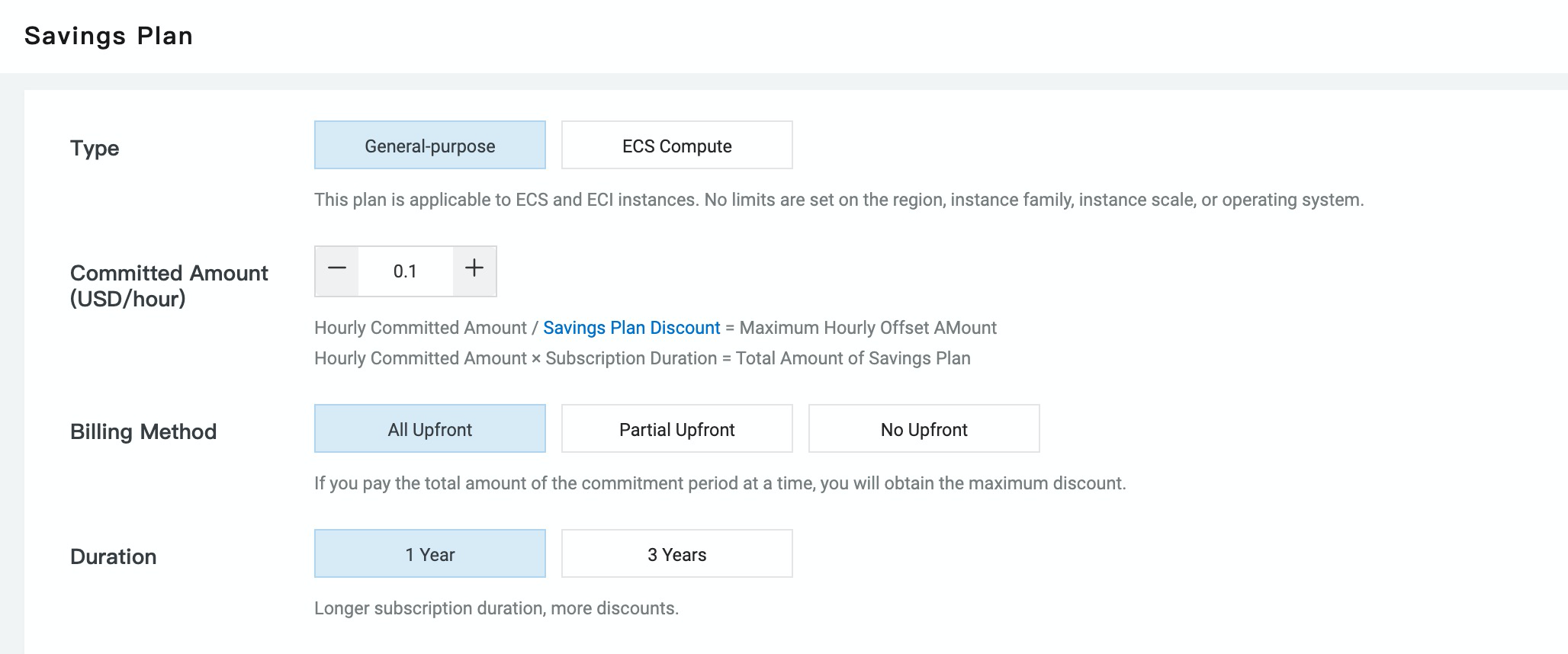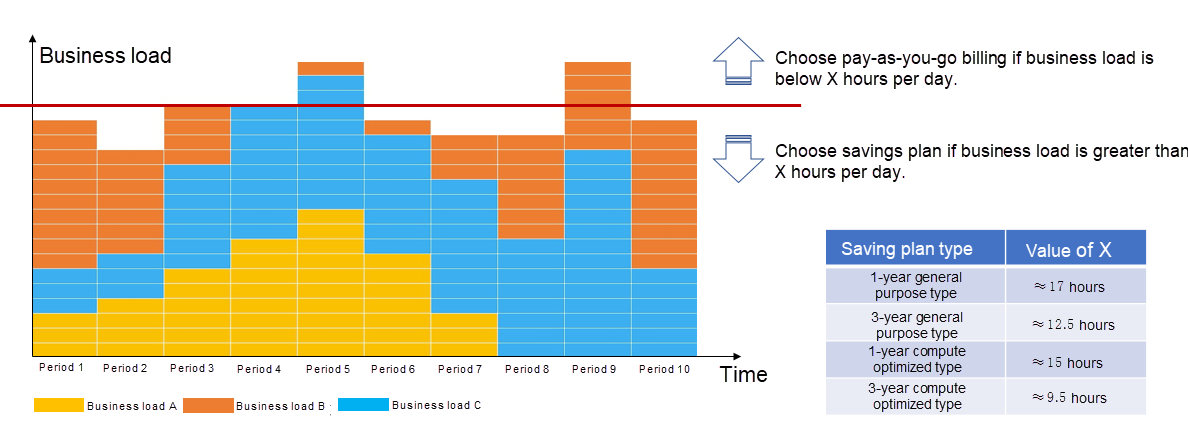At the Apsara Conference 2020, Alibaba Cloud launched new savings plans that help customers optimize their computing costs. Customers can purchase cloud resources in advance and enjoy pay-as-you-go services to improve flexibility and efficiency, as well as reducing costs. This article will introduce the newly launched savings plans in detail.

First, let's take a look at a typical case.
A customer has purchased ten cloud hosts (instances) in zone F of Beijing region for a year using the subscription billing method. Due to changes in business requirements, five of them have to be migrated to zone G after three months. The customer has to ask for a refund of five hosts in zone F and then purchase five new hosts in zone G. This process is unnecessary repetitive and the customer needs to pay for any price differences. This problem can be evaluated from two perspectives:
The root cause of this problem is that the subscription billing method binds product preferences to specific instances. Once a customer makes a purchase, he/she has actually purchased a server on the cloud. By doing so, the customer is bound to the server and any changes due business adjustments will inevitably introduce problems. For example:
(1) When adjusting the region or zone, the customer needs to ask for a refund and repurchase a new host.
(2) When adjusting the computing power, the customer can only upgrade or downgrade the configurations of a server, and this may also introduce additional expenses. Sometimes, such operations cannot succeed due to the technical limitation.
(3) When adjusting the business operations, the customer has to clean up the current business environment and initialize a new business environment. This process involves a large number of invalid O&M procedures.
However, in the cloud native era, most of customers need to adapt to the rapidly changing market and are unable to ensure that they will not adjust their businesses within a billing cycle. Is there a solution to this issue? The answer is simple: pay-as-you-go service. This billing method works because it treats cloud consumption as a resource that can be purchased quickly, similar to a fast-food operation.
Create instances as needed and release when not needed. Any business adjustments should not be limited by the instance lifecycle, nor should it involve complex lifecycle management. This is the way to purchase resources in the cloud native era.
You may be wondering now, if a pay-as-you-go billing method is so beneficial, why would anyone use subscription billing? The answer: cost. Generally speaking, a pay-as-you-go billing method is not cost effective for large and frequent consumption of cloud resources. And that is exactly why Alibaba Cloud has launched the savings plans. This article discusses what the newly launched savings plans are about, and compares how much you can save using the savings plans when compared with a pay-as-you-go billing.
In the simplest terms, the savings plans can be viewed as a "VIP member card" by Alibaba Cloud". This "card" has following features:
(1) Wide scope of application. It can be used for almost all families of ECS and ECI instances in all regions. One purchase provides cost optimization capabilities to all ECS consumption.
(2) Annual validity period. The validity period is either 1 or 3 years.
(3) Fee-based membership card. The membership card itself is charged, but the fee is far lower than the pay-as-you-go billing, which is approximately within the range of annual and monthly subscription billing.
(4) The service covers pay-as-you-go users. Within the coverage of the membership card, users are exempted from charges when using pay-as-you-go instances.

For the full definition of Alibaba Cloud savings plans, see Alibaba Cloud Documentation.
But what exactly is the extent of the coverage of the savings plans? To understand this, let's discuss an important concept for the savings plans, which is known as "committed hourly consumption".

As shown in the figure above, the "committed hourly consumption" is an option on the purchase page of the savings plans.
To put it simply, committed hourly consumption is the upper limit of exemption for pay-as-you-go bills. Within this limit, bills for the pay-as-you-go instance are discounted and then deducted. Let's take a look at a specific example:
(1) The pay-as-you-go price of the ecs.c5.large instance in Shanghai is 0.62 yuan per ECS instance for an hour. (For more information about the instance price, see ECS Price).
(2) With savings plans, the ecs.c5 instance family in Shanghai can be purchased at a discount of 57.8%. (Note: This example uses the one-year general purpose instance with full pre-payment as reference, which will be discussed further. The discount price of the savings plans can be found in Discount Page.)
(3) Suppose the customer selects a committed hourly consumption of 10 yuan.
Note: The price for this example is provided by Alibaba Cloud on September 27, 2020.

The figure above shows the discount details of savings plans in the Discount Page. The number of ecs.c5.large instances that can be deducted per hour for this savings plans is: 10/(0.62*0.422) = 38.22 instances. It can be seen that the committed hourly consumption determines the deduction of each savings plans, which is the card "coverage" mentioned above.
You may notice that 38.22 is not a round number. In reality, only 38 or 39 instances can be used. How do we go about this?
It is very simple actually. If 39 instances are used, 22% of the bill for the 39th instance will be deducted, while the remaining 78% of the bill needs to be paid in regular pay-as-you-go mode. However, if only 38 instances are used, the hourly deduction of 0.22 instances will be unused.
Therefore, it is very important to choose the appropriate committed hourly consumption to maximize your savings. If a customer chooses too few instances, any additional instances still need to be paid in pay-as-you-go mode. If customers choose too many instances, any unused discounts will be wasted. So, how can we optimize this? We will share a detailed analysis in the later sections; you can skip directly to the "How to Purchase Savings plan?" for more details. In addition, the Overview Page of savings plans provides more detailed examples about discounts.
At present, Alibaba Cloud offers two types of savings plans: general purpose type and compute optimized type.
General purpose type can be simply interpreted as having no restrictions. It can be applied to all ECS and ECI instance families in all regions.
Compute optimized type requires a region and an instance family, which applies only to the same ECS instance family in the same region.
General purpose type provides better flexibility, while compute optimized type provides better discounts. As shown in the figure below, for 1-year ecs.s6 instance family in Shanghai with full pre-payment, general purpose type offers a 57.8% discount, while compute optimized type offers a 63.3% discount.
Note: The price for this example is provided by Alibaba Cloud on September 27, 2020.


Currently, Alibaba Cloud offers three payment types: full pre-payment, partial pre-payment, and no pre-payment.
After a customer selects his/her preferred committed hourly consumption, the total price of savings plans (also called total configuration fee in the purchase page) is basically determined. For example, if the committed hourly consumption is 1 yuan per hour, the total price for one year is about: 124365 = 8760. If customer selects full pre-payment, he needs to pay all the fees at the time of purchase, similar to subscription mode. If customer selects partial pre-payment, he needs to pay about 50% of the purchase fee. The remaining fee is included in the hourly bill. If customer selects no pre-payment, he does not need to pay any fees when purchasing. All the fees will be included in the bill of subsequent hours.
In this example, when selecting full pre-payment, the price is displayed as follows:

When selecting partial pre-payment, the price is displayed as follows:

When selecting no pre-payment, the price is displayed as follows:

Note: You may be wondering why the total configuration fee of no pre-payment and partial pre-payment is slightly higher than that of full pre-payment. Here is the explanation from the official documentation:

The discount differs by the type of payment. Full pre-payment receives the highest discount, and no pre-payment receives the lowest discount. Let's compare the discounts offered for 1-year ecs.s6 general purpose instance family in Shanghai:
| Full pre-payment | 57.8% off |
| Partial pre-payment | 57% off |
| No pre-payment | 54% off |
Note: The price for this example is provided by Alibaba Cloud on September 27, 2020.
Compared with subscription mode, savings plans supports pay-by-installment, which can help customers optimize their cash flow. Generally speaking, customers can choose their preferred payment methods based on the actual cash flow and financing costs.
The current savings plans offer two types of durations: 1-year and 3-year models. The discount for 3-year model is greater than that of 1-year model. Let's compare the discounts offered for ecs.s6 general purpose instance family in Shanghai:
| 1 year | 57.8% off |
| 3 year | 72.7% off |
Note: The price for this example is provided by Alibaba Cloud on September 27, 2020.
The process to purchase savings plans are as follows:

As mentioned earlier, the choice of coverage should be optimized based on your actual needs. Let's look at some general tips to help you make the most out of the savings plans.
For the selection of savings plans type:
(1) If the instance family and deployment region are limited, select compute optimized type for higher discount.

(2) If the instance family and deployment region are not limited, select general purpose type for better flexibility. In addition, this option maximizes deployment utilization. By purchasing savings plans for multiple resources, your O&M and billing management can be simplified.
(3) For ECI users, select general purpose type to experience cloud-native cost optimization.
For the selection of committed hourly consumption:
(1) It is recommended that customers purchase savings plans for stable service loads, and continue to use pay-as-you-go billing method for short-term elastic services. The daily use time cutoff points are roughly recommended as follows:
(2) Lower committed hourly consumption is recommended. If it is lower than the actual situation, other deductions can be accessed by purchasing more savings plans.
(3) If your business is mostly built based on pay-as-you-go services, you can select the committed hourly consumption in the recommendation page, which is based on your historical pay-as-you-go consumption.
(4) If your business is mostly built based on subscription billing, you can search for the corresponding pay-as-you-go prices and discounts with savings plans, according to your instance families and regions. After the subscription expires, you can choose pay-as-you-go service and purchase corresponding savings plans instead of renewing your subscription.
For example, say you want to purchase a 3-year general purpose type of savings plans with full pre-payment for 10 ecs.g6.large instances in Shanghai. The pay-as-you-go price for ecs.g6.large instance is 0.5 yuan per hour, and the total price for 10 instances is 5 yuan per hour. The discount for ecs.g6 instance family in Shanghai provided by a 3-year general purpose type of savings plans with full pre-payment is 54.5%. The committed hourly consumption should be: 5*0.455 = 2.275 yuan per hour.
Note: The price for this example is provided by Alibaba Cloud on September 27, 2020.
For selecting of payment type:
You can select the corresponding payment type based on your cash flow and financing cost.
For selecting of duration:
The 3-year model provides greater discounts when compared with that of the 1-year model. You can select your preferred duration based on the size of your business. Generally, with better flexibility of savings plans, longer duration can provide better discounts.
Ready to save more? Click here to purchase your savings plans today!
Alibaba Cloud Helps Us Picture the Cloud Computing Future Over the Next Decade

33 posts | 12 followers
FollowAlibaba Clouder - February 23, 2021
Alibaba Cloud ECS - December 3, 2020
Alibaba Cloud Native Community - July 19, 2022
Alibaba Clouder - February 4, 2021
CloudNative - May 10, 2022
Kidd Ip - July 3, 2025

33 posts | 12 followers
Follow ECS(Elastic Compute Service)
ECS(Elastic Compute Service)
Elastic and secure virtual cloud servers to cater all your cloud hosting needs.
Learn More Function Compute
Function Compute
Alibaba Cloud Function Compute is a fully-managed event-driven compute service. It allows you to focus on writing and uploading code without the need to manage infrastructure such as servers.
Learn More Elastic High Performance Computing Solution
Elastic High Performance Computing Solution
High Performance Computing (HPC) and AI technology helps scientific research institutions to perform viral gene sequencing, conduct new drug research and development, and shorten the research and development cycle.
Learn More Alibaba Cloud Flow
Alibaba Cloud Flow
An enterprise-level continuous delivery tool.
Learn MoreMore Posts by Alibaba Cloud ECS